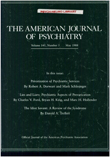An empirical study of psychosis in borderline personality disorder
Abstract
To assess the nature and prevalence of psychotic symptoms in borderline personality disorder, the authors reviewed the cases of 33 patients meeting DSM-III criteria for borderline personality disorder, using both "narrow" and "broad" definitions of psychosis. Only eight patients displayed psychotic symptoms meeting the "narrow" DSM-III definition; in all of these cases, the symptoms appeared to be attributable to either severe drug abuse or major affective disorder, present simultaneously with borderline personality disorder. The remaining patients displayed only "broadly defined" psychotic symptoms or symptoms that appeared to be under voluntary control. These findings weigh against the assumption that borderline personality disorder lies "on the border" of classical psychotic disorders.
Access content
To read the fulltext, please use one of the options below to sign in or purchase access.- Personal login
- Institutional Login
- Sign in via OpenAthens
- Register for access
-
Please login/register if you wish to pair your device and check access availability.
Not a subscriber?
PsychiatryOnline subscription options offer access to the DSM-5 library, books, journals, CME, and patient resources. This all-in-one virtual library provides psychiatrists and mental health professionals with key resources for diagnosis, treatment, research, and professional development.
Need more help? PsychiatryOnline Customer Service may be reached by emailing [email protected] or by calling 800-368-5777 (in the U.S.) or 703-907-7322 (outside the U.S.).



